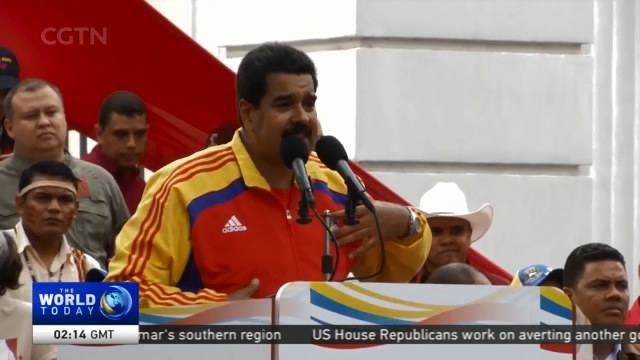
10:49, 06-Feb-2018
Venezuela Economic Crisis: Families resort to trading jewellery for food

Turning now to Venezuela where people are facing extreme shortages of food and medicine. And as a result, locals have resorted to an older method of obtaining supplies: They're bartering whatever goods they have - in exchange for the goods they need. CGTN's Juan Carlos Lamas has more from Caracas.
Lupita Quintero says she's hit rock bottom. A 63-year-old pensioner, living in Caracas with her four sons, she traded a pair of rings for milk, corn flour, and rice.
LUPITA QUINTERO PENSIONER "I had to barter some of my most precious jewelry since I had neither food nor medicine, but now I'm running out of it, and what's worse - I have almost nothing left which could be used to barter."
Sometimes it's a direct exchange of goods. Sometimes Lupita advertises her jewelry on social media, and sells it for cash. Now, she's getting ready to let her great grandmother's bracelet go. After that, she says she'll need to find other ways to pay for what she needs.
LUPITA QUINTERO PENSIONER "I don't feel good about selling my jewelry since they are my family treasures, but I did it out of necessity. I had to barter them. I don't want to die of starvation."
It's not just pensioners who are bartering to meet their basic needs. Street corners in Caracas are filled with people making deals. Venezuelans are trading gold for chicken, pasta for haircuts, plumbing supplies for butter, or medication.
HENKEL GARCIA ECONOMIST "The Venezuelan middle-class family today has the profile of a poor family's expenses. Between 80 and 90 percent of their income is used to cover their basic expenses, and they now need to start selling their goods to be able to supplement their expenses at the end of the month."
President Nicolas Maduro blames his political opponents and foreign powers like the United States for the crisis. The opposition says it's Maduro's mismanagement that's crippled Venezuela's economy.
JUAN CARLOS LAMAS CARACAS "No matter whose fault, for Venezuelans facing severe shortages of food and medicine, grappling with the world's highest rate of inflation -- bartering has become a means to survive. Juan Carlos Lamas CGTN Caracas."

SITEMAP
Copyright © 2018 CGTN. Beijing ICP prepared NO.16065310-3
Copyright © 2018 CGTN. Beijing ICP prepared NO.16065310-3